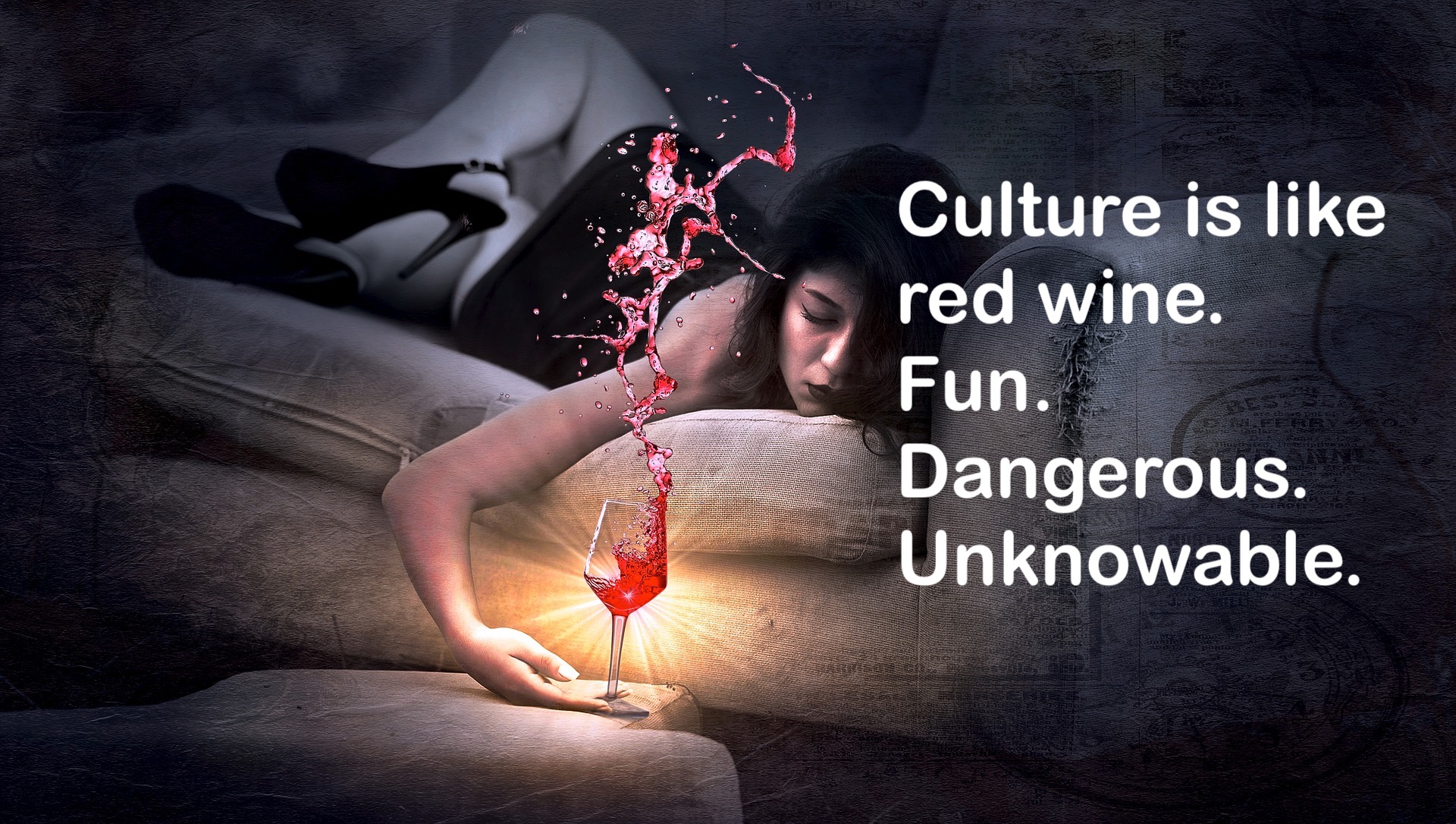Culture. Is it real?
Robert Louis Stevenson
"Wine is bottled poetry...."
Culture is an imaginary concept. It does not exist in the real world.
Let's rattle the cage.
In the organisational world the word 'culture' is firmly entrenched in the lexicon of cult leadership. We speak of culture glibly. We dutifully nod our heads. 'Culture' is real. The gods so decree.
I intend to show you that culture is purely imaginary. And the key to understanding this is in red wine.
You are invited to a wine tasting
The Italian town of Verona is at the heart of the Valpolicella region, famous for it's wonderful red wines.
You have been invited to a special wine tasting of a new red wine with one hundred other invited guests and enthusiasts.
The tasting is launched by the wine maker who paints a great picture of what you may expect. Words like balanced, earthy, fruity, full-bodied, and long on the palate roll off his enthusiastic lips.
After twenty minutes of fine oenophiliac performance everyone is invited to sample the new red wine.
You are even given a piece of paper to score various dimensions.
Now here is the problem.
We know one thing. Each of the one hundred tasters will taste the wine differently. And there is absolutely no way that any one person can convey their actual taste and emotional experience to anyone else.
Sure, we can fumble around and talk about 'smokey' or 'oak' or 'cigars' or 'raspberries', but that is all just a game. It's all fun but it means little.
The fact is simple. Each person's experience of the wine will be unique to that person and the experience itself will be beyond the horizon of words. Absolutely and completely.
From wine to the culture of an organisation
Now imagine a large bank with a million customers and repeat the exercise.
Ask each customer to write down their experience of the bank's culture. Again each person's story will be made of unique and different actual experiences, with each experience being 'for the first time.'
Thus each customer will have their own story, which like the taste of the red wine, cannot be shared in any real and absolute sense. All we will find is an infinite set of anecdotes, from which we may attempt to infer the bank's 'culture'. But of course there is no actual culture. Just stories, infinitely varied. The bank may be both 'good' and 'bad' at the same time.
A little like Schrodinger's cat which can be both dead and alive.
From wine and culture to the science of leadership energy and organisational DNA
I hope I have persuaded the reader to at least think again about what we mean by organisational 'culture'.
Our experience has shown us conclusively the following:
- Every organisation evolves an equilibrium system energy level.
- This equilibrium is maintained through the system's own evolved DNA - the conscious rules and unconscious meta-rules that guide everyone's behaviour.
- A system's energy level determines its strategic capability. No system may operate outside of its own energy boundary.
- Leadership energy - the combination of available obsession and imagination - determines the system DNA and energy level.
- Leadership energy can be trained and developed continuously over time.
- If leadership energy is not trained and developed consciously and professionally, leadership will evolve as a random process akin to the blind leading the deaf.
From 'cultural transformation' to the science of sculpting a high-energy system DNA
If you can accept 'culture' as largely mythical then it follows that 'cultural transformation' is an oxymoron.
The new science suggests that we need to do the following.
- Measure leadership and organisational system energy.
- Assess the DNA profile of the organisation.
- Customise and drive the new leadership behaviours that are consistent with scientific and evolutionary principles to generate higher energy and a new DNA.
And perhaps think twice next time before loosely referring to 'culture' as a real thing?
Enter your text here ...
Comments 3
Hello there!
Yes, I know the cage-feeling ! It's been really bad. But now it seems as if new energy starts to pour in again, in small bits and pieces. That's why it was so great to find your website and the constructions and narratives of the meaning of energy in organizational life, Of course I know that you have been working on this but it all seems to have taken a new leap. Congratulations! I like the way the concept of culture turns up in your writing. And of course Schodringers cat which is both in the box.
Look forward to moments of sharing your approach more profoundly since it seems that we are landing at somewhat similar ideas and constructions. Voilà, a new language of leadership.
By accepting you will be accessing a service provided by a third-party external to https://quanta.consulting/

